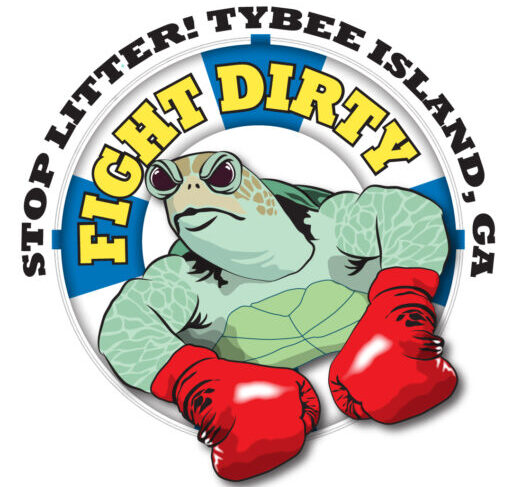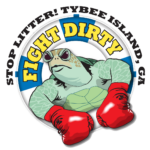The Facebook profile photo for Fight Dirty Tybee gets your attention. It’s one word written on the beach. It’s not what you usually see in script drawn in the sand with a finger or stick. It’s not somebody’s name or “Peace” or “Love” or curvy lines that will wash away with the next tide.
The word is “Quit,” and it’s formed in block letters with piles of cigarette butts. Butts that were litter just hours before. Butts picked up by people who love the unspoiled beauty of the beach.
Every Sunday evening or Monday morning from spring to fall there is a beach clean-up hosted by the grass-roots group Tybee Clean Beach Volunteers (TCBV). They scour the beach for all the litter left behind by weekend crowds.
It’s straightforward work that is instantly rewarding. You make an immediate environmental and aesthetic difference. I joined the effort at the pavilion at 9:30 a.m. June 1.
Tim Arnold and the TCBV team were signing people in. Each volunteer got two pieces of equipment. That’s all you need — a bucket for one hand, a reacher/grabber for the other. The bucket has a painter’s cup hung inside it for cigarette butts; the rest of the bucket is for everything else.
As I looked out over the already-hot shimmering beach, the volunteers were silhouetted against the glare of the water, and they reminded me of Picasso’s famous black-and-white sketch of Don Quixote. The Lyric Stage of Dallas produced “Man of La Mancha” last year, and their poster featured that image against a background like the Tybee summer sun.
These volunteers, however, were not on horseback, using lances to tilt at windmills. They were on foot, using grabbers to pick up butts. Kansas visitor Denise Duerksen said, “A clean beach is not an impossible dream.”
After the morning’s sweep I spoke with Arnold, and he gave me some stats on the two-hour clean-up. He was happy with the turnout of 58 people for their first “post-COVID” sweep. The equipment they supplied was sanitized. The team did the litter sorting afterward, so that volunteers could keep good distancing on that step.
“We get a lot of families who help,” said Arnold. I saw exuberant groups like Kristin Herbert and her three sons Alexander, Anthony and Andrew. Danielle Wiltie and her young son Asher were eagerly darting their grabbers and enjoying the cool action of the pinchers.
Susan Hoang was shepherding a group of kids from Talahi and Whitemarsh islands as they dueled on and off with their grabbers. A pair of students from Spelman College majoring in environmental science said that they really appreciated the eco-friendly buckets.
Arnold said that the EcoSmart buckets themselves are made from recycled plastic. “And we use Ettore grabbers that are easy to rebuild. You can pick up 200 butts and not break a sweat.”
“We try to be a zero-waste beach sweep.” They don’t just collect trash and send it to landfill. They use elbow grease and willpower to find a recycling home for all the litter streams.
Arnold joked that Terracycle, where they send cigarette butts, had called recently to ask if there was a problem because they had not gotten any recent shipments. “It’s because we’re holding about 100,000 behind the Tybee Marine Science Center to be used for an educational display. Terracycle breaks butts down to plastic for plastic pallets, ash and tobacco to compost, etc.
Local corporate groups who help us don’t come with single-use water bottles, individually-packaged snacks, or disposable gloves. Instead they bring Igloo coolers, sturdy reusable bottles, personal gardening gloves, bananas and apples that we compost.”
“We get lots of local help from Boy Scouts, Girl Scouts, students from New Hampstead and Heard and our colleges. Vacationing tourists are glad to discover us and to participate. They tell me, ‘We’re happy to help keep a clean beach. That’s why we came.’”
Ben Goggins, a retired marine biologist, lives on Tybee Island. He can be reached at 912-547-3074 or[email protected].

